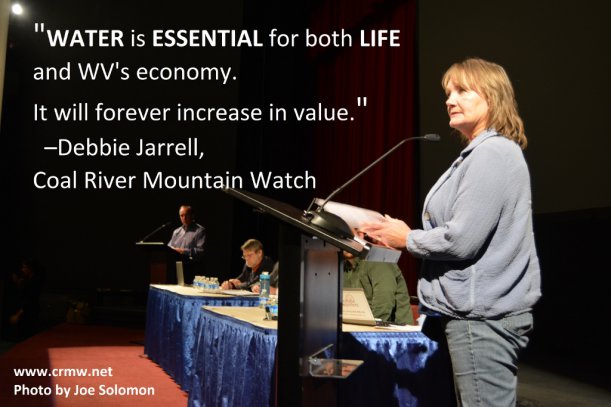
Trump Revokes Clean Water Protections
Feb 16, 2017
WASHINGTON-Pres. Donald Trump today signed into law a resolution of disapproval rescinding the Stream Protection Rule, a modest safeguard crafted to protect clean water and the health of communities threatened by coal mining. Lawmakers voted to overturn the rule using the Congressional Review Act, a seldom-used law that takes the public out of the process by allowing recently finalized regulations to be rolled back virtually overnight with little debate. Many years in the making, the Stream Protection Rule was the first significant update to surface mining regulations in 30 years.  Coal River Mountain Watch co-director testifying for the Stream Protection Rule in 2015.
Coal River Mountain Watch co-director testifying for the Stream Protection Rule in 2015.
Statement from Jenifer Collins, Earthjustice Associate Legislative Representative:
“It is shameful that one of the first bills President Trump signs into law is an attack on clean water protections for communities facing the harmful health and environmental impacts of coal mining operations like mountaintop removal mining. During his campaign, the President said Americans need ‘crystal clear and clean water.’ If he really meant that, he would have vetoed this legislation.”
In Appalachia, some 2,000 miles of streams have already been destroyed by mountaintop-removal mining, which has also destroyed more than a million acres of forest. Safeguards under the Stream Protection Rule would have extended to anywhere coal-mining operations are proposed or underway.
Statement from Vernon Haltom, Coal River Mountain Watch:
“Revoking the Stream Protection Rule sends a loud and clear message that Appalachian people's health, communities, and water are acceptable sacrifices for the profits of coal executives and their Wall Street backers. The ongoing devastation by mountaintop removal will continue with no effective regulation and no protection for the people whose lives it threatens.”
Statement from Natalie Thompson, Ohio Valley Environmental Coalition:
“Voting to overturn the Stream Protection Rule in its entirety with no consideration for the health of our citizens and our ecosystems is completely irresponsible. The people in these coal communities will pay the price by being forced to purchase potable water that they cannot afford or by combating cancer, birth defects, and other invasions of human health by way of toxic water.”
In Alaska, vital salmon streams are often located in immediate proximity to coal deposits, jeopardizing the health of pristine waterways that are essential to wild fish runs.
Statement from Bob Shavelson, Advocacy Director of Cook Inletkeeper:
"The politicians now in charge in Washington, D.C. are out of touch with Alaskans. Across our great state, Alaskans want healthy wild salmon streams. But many of the political elites don't get it—they take money from the coal corporations and ignore the will of the people.”
Statement from Jane Davenport, Defenders of Wildlife Senior Staff Attorney:
“President Trump just rubber-stamped the mining industry’s shameful legacy of polluting waters that communities and endangered wildlife need to survive. Congress relied on the obscure Congressional Review Act to overturn clean water protections and instead put more money in big polluters’ pockets. This is a sad day for everyone who cares about clean water for wildlife and for future generations.”
Statement from DJ Coker from Habersham, Tennessee with Statewide Organizing for Community eMpowerment:
“For youth like me to have a thriving future, we must protect our most valuable resource, our water, which is critical for the overall health and prosperity of Appalachian communities like mine. It is ludicrous that the leaders of this country would disregard such vital safeguards in the Stream Protection Rule, not only for the protection of the environment but the people as well."
Destruction of streams by mining and the toxic runoff from these operations harm aquatic life and can put human health at risk. Dozens of peer-reviewed studies have linked mountaintop removal mining with health impacts such as cancer and birth defects. The Stream Protection Rule required monitoring to detect harmful chemicals in surface water and groundwater, but now this information will remain hidden from local residents.
According to the Department of the Interior, industry compliance costs associated with the rule would have amounted to approximately 0.3 percent of estimated 2015 coal revenues. Getting rid of the Stream Protection Rule using the Congressional Review Act will not bring jobs back to the declining coal industry, which is facing numerous bankruptcies due to its failure to compete with other energy sources, not due to protective environmental regulations.
Eighty local and national environmental organizations recently sent an open letter to lawmakers asking them to reject legislative attacks on clean water. Representing millions of members and supporters, the groups decried the rollback of the Stream Protection Rule under the Congressional Review Act as a threat to universal access to clean, safe water.
###
RESOURCES
Earthjustice Explainer on Stream Protection Rule
Congress Prioritizes Coal Interests Over Clean Streams
Community Letter Opposing Congressional Attacks on Stream Protection Rule















